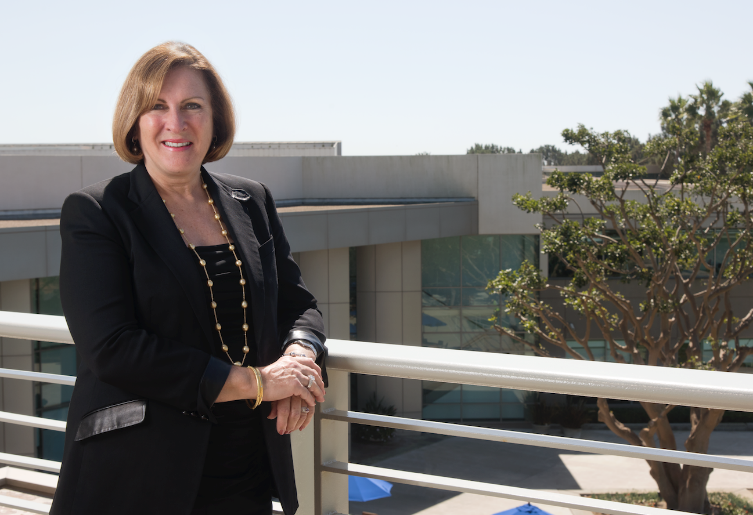A conversation with Susan Jacques, President and CEO GIA (Gemological Institute of America)
Warren Buffett once invited her to work. Growing up in Zimbabwe and after graduating from high school, she became a typist instead of going to university. With a passion for gemstones, she took advantage of the opportunity and moved from Africa to California to earn a bachelor's degree in Gemology from the Gemological Institute of America (GIA) exactly 40 years ago. With a penchant for colored diamonds, a passion for consumer protection, and stories so fantastic they could be mistaken for movie scripts, Susan Jacques seems born to lead one of The most influential company in the jewelry industry, GIA, includes 3,400 employees, 11 diamond grading laboratories, and 7 schools around the world.

Susan Jacques, GIA President and CEO
Q: Can you tell us about the first diamond in your life?
The first important diamond I was given was my engagement ring. My husband and I got engaged on Memorial Day weekend 30 years ago. We chose a beautiful oval-shaped, yellow Fancy Deep diamond for the engagement ring. I love it. It looks like a sunflower and like a ray of sunshine on my finger. I appreciate the beauty of colored diamonds, one of my favorite gemstones.
Q: What makes you most optimistic at this time?
These are very challenging times, but I am grateful for the blessings in my life. During quarantine, I was fortunate enough to live on my family's farm in Nebraska and spend some wonderful time with my husband and two of my three sons. My middle son has been working remotely and my youngest, 13, is learning remotely. Time with family is a very special gift. We went for a walk together and I felt so moved by the brilliant natural world in which we live.
I am also happy for the strong and resilient human spirit. The love and support between people during this time has inspired me. So too is the creativity and ingenuity of people who are finding new ways to connect and build community during these difficult times.
Q: What are your plans for next year?
First and foremost, I will do everything I can to keep our staff, students, and visitors safe and healthy. Specifically, that includes our 3,400 employees, visitors to our 11 laboratories, and students at 7 schools around the world as GIA begins to reopen post-pandemic.
I remain dedicated to our mission of protecting consumers. At GIA, we are no strangers to turbulent times. GIA was founded in 1931, shortly after the U.S. stock market crash of 1929, with the goal of ensuring public confidence in gems and jewelry. We achieve this goal through educational and research efforts. I am confident that the jewelry industry will bounce back from recent challenging months, as people will continue to use jewelry to celebrate life's milestones; We always want gifts to pass from generation to generation. Sustainability and provenance will become increasingly important, and those are criteria we have been focusing on for some time now.
Finally, I will continue to circulate independent grading reports within the industry. With travel restrictions, there will be more business-to-business and business-to-consumer online transactions. As this trend of offline purchases grows, scoring reports will become much more important because through them we can help ensure that people have accurate information about the items they are buying.

I get inspired by student assignments. One of the most intriguing and exciting designs for me recently was by talented GIA student Yi-Hsuan Chiang, which was the winner of the 2019 Gianmaria Buccellati Foundation Award for Excellence in Jewelry Design. The design features rhinestones. amethyst, diamond, moonstone, conch pearl, coral, black opal and Baroque pearl. Photo by Emily Lane / GIA.
Q: What is your greatest passion?
Tourism! I love exploring new places. My husband and I are planning a trip to Africa for our anniversary this year. I was born and raised in Zimbabwe. Our plan was to visit nearby Botswana and also Zimbabwe, including one of my favorite places in the world, Victoria Falls. I love Africa and I always joke that my next career will be driving jeeps in the reserves there. There's nothing more magical than driving through a reserve and seeing Mother Nature at her best.
Q: Which diamond destination tops your list?
Argyle mine in Australia. Unfortunately, I suspect the trip will be difficult to come by as the mine will probably close this year. I would love to see where there are so many colored diamonds from brown and yellow tones to fancy pinks, purples and reds.
I had the opportunity to visit 5 different diamond mines to see the beginning of the diamond journey. Once, at the bottom of a mine, I said to a young man taking me on a tour, “It would be much easier to sell a diamond if people could see this.” Be aware that most diamonds are over a billion years old. Objects that are a billion years old are most likely in museums, not on your fingers! There is an extraordinary and romantic story behind the stones called diamonds.
Q: What inspired you to pursue a career in the jewelry industry?
I found my passion by stepping out of my comfort zone and taking chances. When I finished high school, I took a job as a typist at a jewelry company in Zimbabwe. Finally, I took the risk and left Africa to study at GIA, which was located in Santa Monica at the time. The course began on June 17, almost exactly 40 years ago. A classmate had a retail jewelry store in Omaha, Nebraska and after finishing at GIA, I moved there to gain retail experience. I ended up staying for 3 decades before joining GIA in 2014. In life, when the door opens, we know nothing about the path on the other side. We need courage to walk through a door but it's easy to stay in our comfort zone. Understanding that has helped me make difficult decisions.
Q: What moment do you remember most in your career?
The day I received a phone call from Warren Buffett, inviting me to come to his office and meet him. Warren owned Borsheims, where I worked at the time, and I had never met him personally before. I was surprised. Warren asked me if I could become president of Borsheims and I spent the next hour explaining why that wouldn't be a good idea. I told him that I never went to college, that I might fail and more. He convinced me to take the job and I reported to him for two decades. He was a great mentor and a very knowledgeable man. He taught me to take calculated risks and develop myself over the years.
Q: What life lesson was the hardest, and taught you the most?
A piece of advice from Warren has become a mantra in my life: “Don't say or do anything that you wouldn't want read about on the front page of tomorrow morning's paper by your family, friends, colleagues, and customers. your. It takes years to build a reputation but only minutes to lose it. In business and in life, it is important to have high integrity and the right moral compass. Reputation is earned from the choices we make every day, and each choice can destroy it or enhance it.
 Robert Mouawad University in Carlsbad, California is the Headquarters of the Gemological Institute of America
Robert Mouawad University in Carlsbad, California is the Headquarters of the Gemological Institute of AmericaQ: What advice do you have for your younger self?
Dare to take calculated risks, and perfection is not always achievable. I just read a meaningful quote “We are not perfect, that's why pencils have erasers.” Being willing to take risks and let go of perfection helped me step outside my comfort zone. I'm so grateful I dared to do it.
Q: What needs attention for the diamond industry?
I believe there is a bright future for diamonds. People will demand more education, transparency and accountability from our industry. Women who pay for themselves will become increasingly powerful, even though they have always held important positions. In the past, even when a man was the buyer, women were often the movers.
Customer relationships continue to be extremely important. Sellers are gradually realizing the need to tell jewelry stories, including the story of natural diamonds. We need to put aside the exchange of goods to share the passion and emotion of business with everyone. As the world moves online, we must find ways to apply digital technology to create personal connections and relationships.

